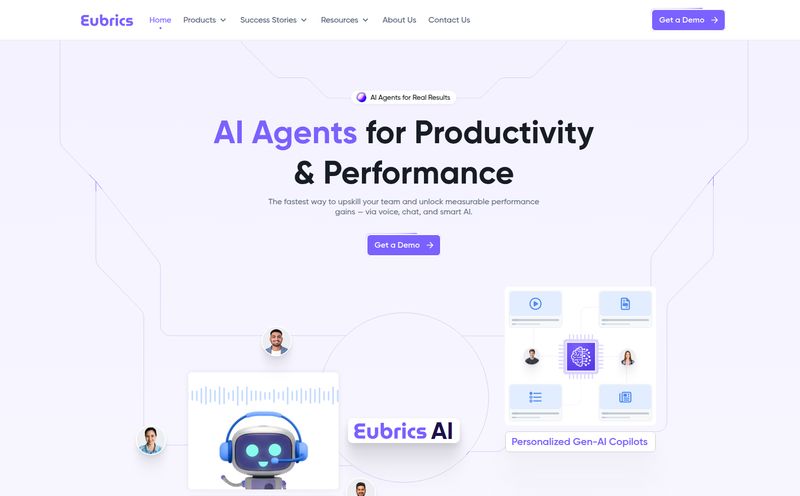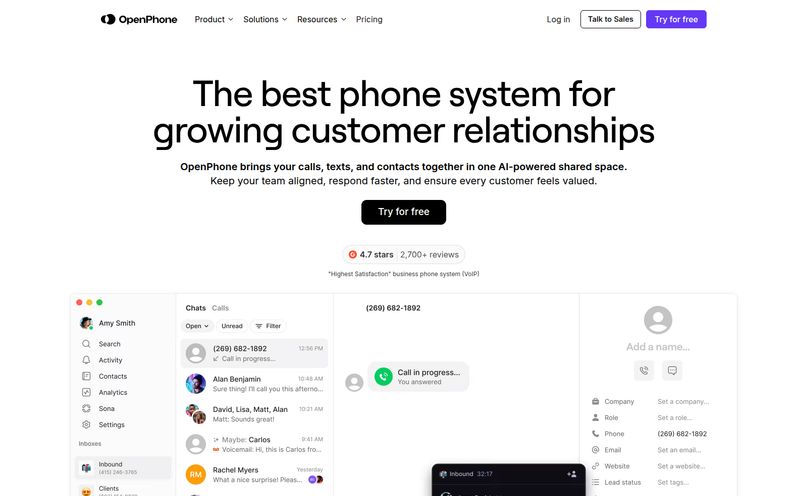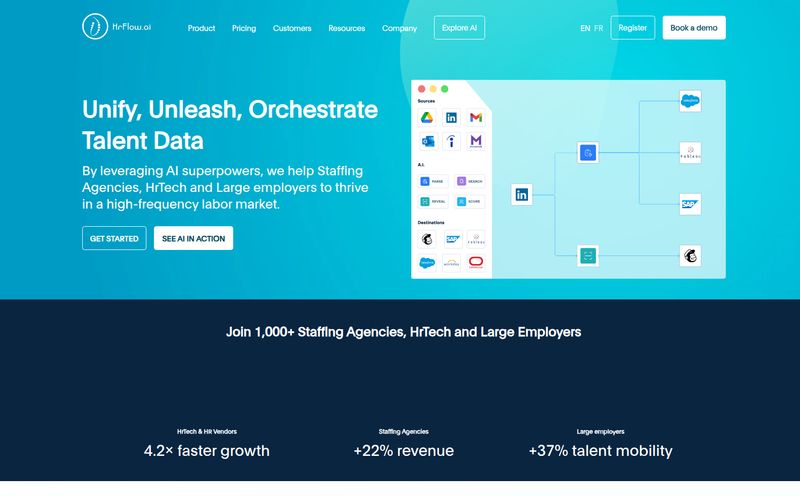When OpenAI opened the floodgates with custom GPTs and the GPT Store, it was pure, unadulterated chaos. And I mean that in the best way possible. Suddenly, everyone and their dog was a 'GPT developer,' launching everything from hyper-specific SEO auditors to AI sommeliers. It was exciting! It was the wild west. But it was also... a mess.
Trying to find a genuinely useful, well-built custom GPT felt like panning for gold in a river of mud. You'd scroll through Twitter threads, get lost in Reddit rabbit holes, and click on a dozen different 'Top 10 GPT' lists that were all basically the same. I was getting fatigued. I just wanted a simple, organized place to see what's out there. A library, not a mosh pit.
That's about the time I stumbled upon WhatGPTs. And it felt like a breath of fresh, non-hallucinated air.
So What Exactly is WhatGPTs Anyway?
In the simplest terms, WhatGPTs is a directory for custom GPTs. Think of it like a Product Hunt or a Capterra, but specifically for those little AI assistants we're all becoming so reliant on. It’s not trying to reinvent the wheel; its trying to organize the thousands of wheels that are rolling around all over the internet. The platform serves as a centralized hub where developers can show off their creations and users can, you know, actually find them without wanting to tear their hair out.
It's a straightforward concept, but one that's desperately needed. It aims to bring some order to the beautiful, sprawling chaos of the generative AI boom.

Visit WhatGPTs
Navigating the Digital Flea Market of Custom GPTs
The first thing I noticed when I landed on the site was its simplicity. Thank goodness. No flashy, confusing animations, just a search bar and a list of categories. You can immediately start browsing through sections like Coding, Text to Speech, SEO (my personal favorite, obviously), Design, and Marketing. There's a ton of different categories, which is great for discovery.
The search functionality is exactly what you'd expect, but it works. If you're looking for a GPT to help you write social media copy, you just type it in and see what pops up. Each listing gives you a quick snapshot: the GPT's name, its creator, and a brief description. It's not super detailed on the first look, but it’s enough to decide if you want to click through to the actual GPT on OpenAI's platform.
One of the more interesting aspects is the ability for anyone to add their own GPT. This is huge for creators. Getting your custom GPT noticed in the official store can be tough, it's already so saturated. A directory like WhatGPTs gives you another shot at getting in front of the right audience. You can submit a GPT for free, or you can pay to have it 'featured,' which gives it more prominent placement. A classic freemium model that seems pretty fair.
The Good, The Bad, and The... AI-Generated?
No platform is perfect, right? After spending a good bit of time poking around, here’s my honest breakdown.
What I Really Like (The Pros)
The biggest win for WhatGPTs is its very existence. Having a centralized, browsable directory outside of OpenAI's own ecosystem is fantastic. It encourages discovery in a way that just isn't possible when you're relying on social media algorithms. I’ve found a couple of niche tools for structured data and internal linking that I probably never would have found otherwise. It’s also a great way for developers to get their work seen, especially if they’ve built a super-useful tool that’s struggling to get traction. Giving people a platform to showcase their work is always a positive in my book.
A Few Caveats to Consider (The Cons)
Now for the other side of the coin. Because the platform relies on user submissions, the quality can be a bit of a mixed bag. This is the inherent challenge of any open directory. For every brilliant, well-crafted GPT, you might find five that are just a simple prompt wrapped in a shiny name. There's a potential for spam or just low-effort listings. You still have to do a little bit of your own vetting. The 'quick view' is also quite limited; it would be nice to see a bit more information—maybe user ratings or a comment section—directly on WhatGPTs before clicking away to the GPT itself. But perhaps that’s something they’ll add down the line.
So, What's the Price Tag on This?
This is the best part. For users who are just browsing and looking for GPTs, WhatGPTs is completely free to use. You just browse, find something you like, and click the link to go use it (assuming you have a ChatGPT Plus subscription, of course). There's no paywall or subscription fee to search the directory.
The cost comes in for the creators who want to list their GPTs. As I mentioned, there are two tiers:
- Free Listing: You can submit your GPT to the directory at no cost. It'll be there for people to find through search and category browsing.
- Featured Listing: This is a paid option. While the site doesn't list a specific price (it's likely variable or requires contact), featured listings get premium placement on the site, which means more eyeballs and a higher chance of being discovered.
I think this is a smart model. It keeps the platform accessible for everyone while creating a revenue stream to maintain and grow the site. It's a classic web directory play, updated for the age of AI.
Who Is This Platform Really For?
I see a few key groups getting a lot of value out of WhatGPTs:
- AI Power Users & Hobbyists: If you're constantly looking for new AI tools to streamline your workflow or just to play with, this is your candy store.
- Marketers, Writers, and SEOs: We're always on the hunt for an edge. A tool that can speed up keyword research, generate content ideas, or analyze SERPs is gold. This directory makes finding those tools much easier.
- Developers & GPT Creators: If you've built a custom GPT, you absolutely should list it here. It's a free marketing channel. Can't argue with that. Getting early users and feedback is critical, and this is a direct line to an engaged audience.
Frequently Asked Questions About WhatGPTs
Is WhatGPTs free to use?
Yes, for anyone looking to discover and use GPTs, the directory is completely free to browse. The cost is for creators who want to purchase a 'featured' spot for their own GPTs.
How is this different from the official OpenAI GPT Store?
Think of it as a complementary tool. The official GPT Store is the primary marketplace, but its discovery features can be limited. WhatGPTs acts as an independent, third-party directory that offers a different way to browse and categorize, potentially making it easier to find niche or new GPTs that get lost in the official store.
Can I trust the quality of the GPTs listed?
It varies. Since it's a user-submitted directory, the quality isn't guaranteed by WhatGPTs. It's a good starting point for discovery, but you should always test a GPT yourself to see if it meets your standards. Treat it like any app store—read the description, check out the creator, and give it a try.
How do I add my own custom GPT to the directory?
There's a 'Add GPT' button on their website. You'll likely need to create an account, and then you can submit the details of your GPT, including its name, description, and the link to it on the official store.
Are GPTs with 'Actions' included?
Yes, the directory includes all sorts of custom GPTs, including more advanced ones that use Actions to pull in live data from third-party APIs or perform specific tasks outside of the standard chat interface.
My Final Thoughts
Look, WhatGPTs isn't a revolutionary, earth-shattering invention. It's something much more important: it's a simple solution to a real problem. It brings a much-needed sense of order to the wild, exciting world of custom GPTs. It’s a useful tool for discovery and a valuable platform for creators.
Will it be the definitive, final answer for GPT discovery? Probably not. The space is moving too fast. But for right now, it's a fantastic resource that I've already bookmarked. It saves me time, helps me find cool new tools, and that, in my world, is a huge win. It's a well-executed idea in a space that desperately needs more organization. And for that, it gets a solid nod of approval from me.



